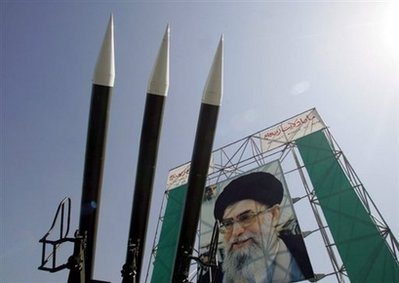A deal on Iran’s nuclear program this week would be a historic step towards ending the country’s international isolation, but analysts remain divided on whether it would help stabilize the Middle East or even prevent a regional arms race.
Having spent years pushing for an agreement — whereby economic sanctions on Iran are relaxed in exchange for concrete guarantees that it will not pursue nuclear weapons — the West hopes the last-ditch talks in Vienna set an example to the world.
“It would… demonstrate that the global non-proliferation system works,” said Mark Fitzpatrick, a former US State Department official now at the International Institute for Strategic Studies in London.
“A combination of rules and pressure would have kept the number of nuclear-armed states from expanding, and that’s no small achievement.”
But there are many on the more hawkish side of the debate who feel the exact opposite could happen.
The Middle East is immersed in a series of bloody sectarian conflicts that have increasingly taken on the form of a region-wide struggle between Sunni and Shiite Muslim powers.
The hawks warn any rapprochement between the West and Shiite Iran will be viewed with deep concern by Sunni-led countries such as Saudi Arabia and the United Arab Emirates — America’s traditional allies in the region — who will not trust Tehran to keep its promises.
“Unless it is a spectacularly better deal than anticipated, it is going to lead to a Sunni response in which they move forward on their own nuclear programmes,” said Mark Dubowitz of the right-wing Foundation for Defense of Democracies in Washington, DC.
“The Saudis could buy a ready-formed nuclear missile from the Pakistanis tomorrow. Or more likely, they could move ahead under the guise of a civilian program. The Turks, the Egyptians could do the same.”
‘Very cautiously’
Others say Washington is well aware of its allies’ concerns and will go out of its way to reassure them — not just the Sunnis, but also Israel which fears a threat to its very existence from a nuclear Iran.
“Any reconciliation between the US and Iran would proceed very cautiously and on the basis of what’s in America’s best interests and those of its traditional allies in the region,” said Robert Einhorn, a former special adviser on non-proliferation at the US State Department now at Brookings Institution.
Much will come down to the details. Regional governments will pore over the fine print of any deal, looking for weaknesses that Iran can exploit to pursue nuclear weapons without getting caught.
The outlook for Iran is more clearly positive. A deal would mark a symbolic end to 35 years of diplomatic isolation, help rebuild an economy shattered by Western sanctions and potentially strengthen the hand of moderates inside the country such as President Hassan Rouhani.
The lifting of sanctions will lead to “massive investments in the oil sector,” said Bernard Hourcade, an Iran specialist at French think tank CNRS, with new contracts already prepared to attract the likes of Total and Shell.
“Banks will be able to restart international negotiations and re-open credit lines. A large market will be put in place,” added Hourcade.
Russia will also be watching with mixed feelings. It worries the return of Iranian oil on the global market will lead to a further drop in prices, but also likes the prospect of selling more civil nuclear technology to Iran.
“A deal would cement Russia’s position as a major player in the region since it will have a central role in implementing the deal, which will take many years. It ensures the US remains dependent on Russia,” said Shashank Joshi, of the Royal United Services Institute in London.
Don’t get excited
Before anyone gets too excited, however, analysts warn it is far from certain that Iran and the West will forge an agreement before the deadline on November 24, with most predicting another extension.
“The most that’s achievable is agreement on some of the key parameters of a deal such as enrichment capacity and phasing of the sanctions relief,” said Einhorn.
Even a complete deal will not have the dramatic impact many are anticipating, added Ali Vaez of the International Crisis Group.
“A nuclear agreement could potentially serve as a gateway allowing Iran to renew cooperation with the West on issues of common interest such as stability in Afghanistan and Iraq, extremism in Syria, and European energy security,” he said.
“But this is not guaranteed. The history of Iran’s relations with the West is replete with misunderstandings and missed opportunities.”










